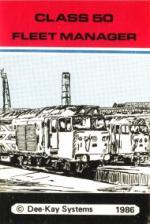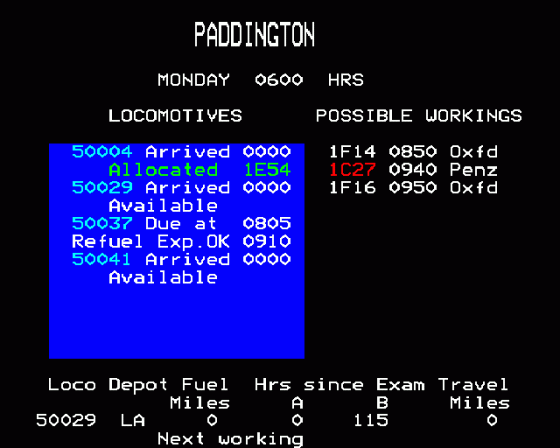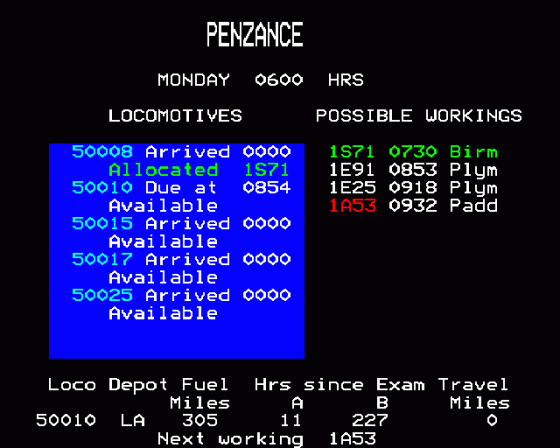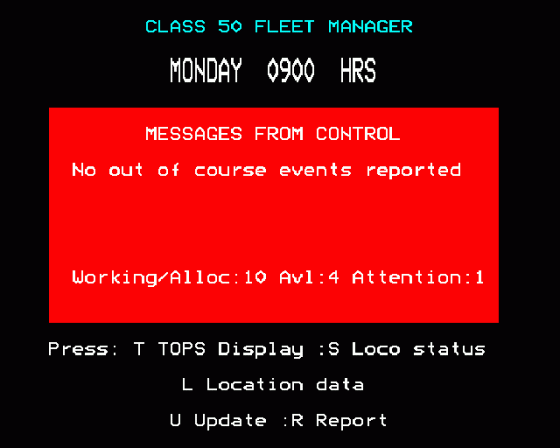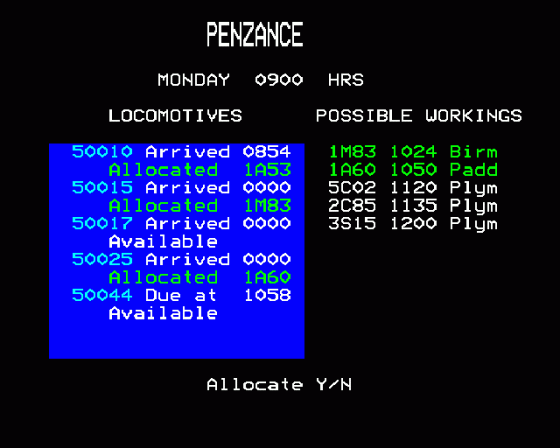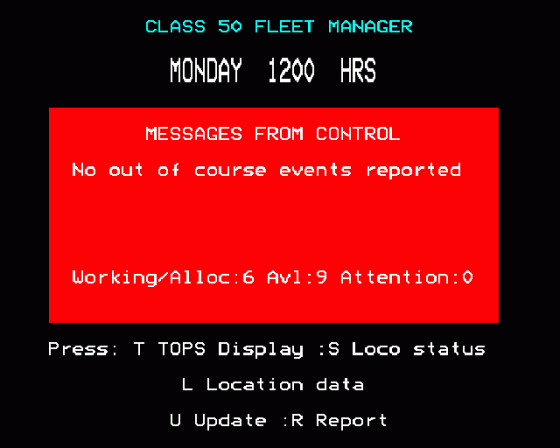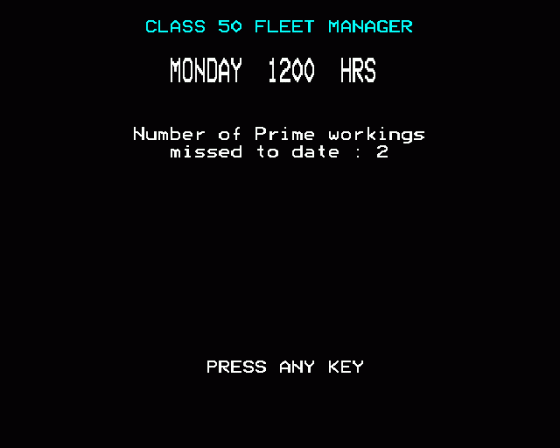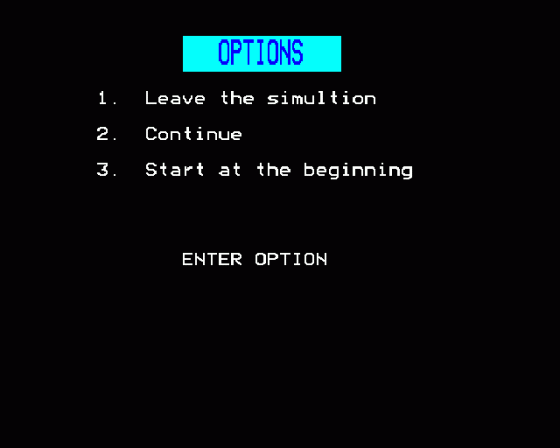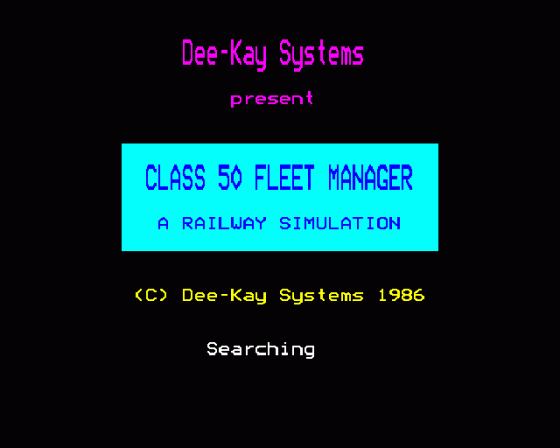
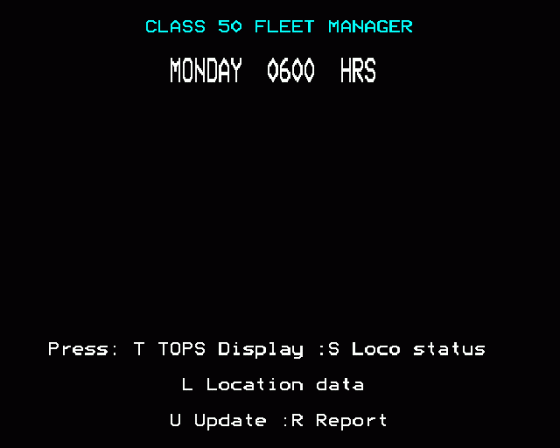

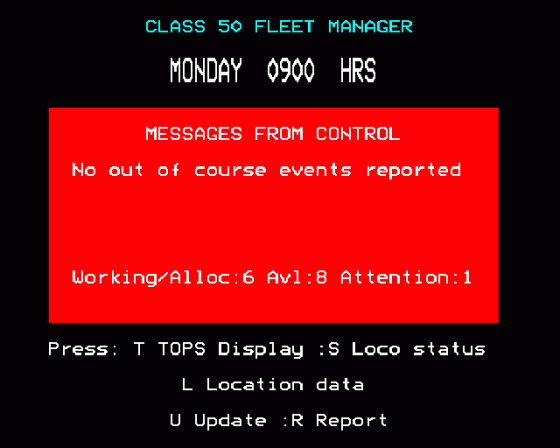
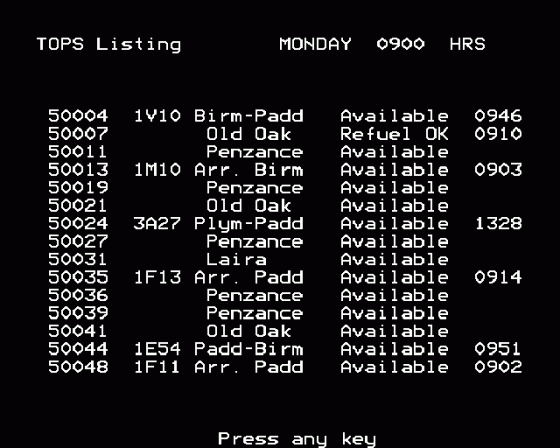
| Genre: | Game: Simulation |
| Publisher: | Deekay |
| Cover Art Language: | English |
| Machine Compatibility: | BBC Model B |
| Release: | Professionally released on Cassette |
| Available For: | BBC Model B & Spectrum 48K |
| Compatible Emulators: | BeebEm (PC (Windows)) PcBBC (PC (MS-DOS)) Model B Emulator (PC (Windows)) |
| Original Release Date: | 22nd April 1986 |
| Original Release Price: | £7.50 |
| Market Valuation: | £2.50 (How Is This Calculated?) |
| Item Weight: | 64g |
| Box Type: | Cassette Single Plastic Clear |
| Author(s): | Ashley Greenup |
Variant Items
There are 0 other items featuring this same game (that we know about!). Click any of them for their details.
Active Auctions
Closed Auctions
Buy It
Unfortunately no-one is currently selling this item.
Auction Price Watch
Worried you're being ripped off? Closing prices on eBay can help you decide what a reasonable price is for a particular item.
Full Instructions
Class 50 Fleet Manager
The fifty Class 50 locomotives, with their 2,700 hp English Electric 16 CVST engines, geared for 100mph running, are the most powerful express passenger diesel locomotives in current service with British Rail. Derived from the Deltic-bodied DP2 prototype, the locomotives were transferred to the Western Region from the Midland on completion of the West Coast electrification to Glasgow in the mid 1970's. In reputed very run-down condition, the locomotives underwent major refurbishment at Doncaster works to emerge as the flagships of the Western Region loco-hauled fleet, assigned to most principle non-HST workings.
In this simulation, set in the summer of 1984, you are a controller in Western Region headquarters at Swindon, charged with the task of allocating weekday duties to a fleet of 15 Class 50 locomotives (at weekends, most of the class are commandeered for Saturday West of England holiday traffic, with Sunday spent getting locomotives and stock back in position). A set of priority workings should be rostered for Class 50 power, with other workings used to amass the highest possible weekly fleet mileage bearing in mind the constraints of fuelling and maintenance.
Available Workings
A timetable of available workings is given in the Appendix, and a schematic plan of principal locations with route mileage is shown below. Throughout the simulation, workings are referred to by four-character reporting codes: the first digit being the train category, the next letter a region or area destination code, and the final two digits the train working number. Prime workings which should be allocated a Class 50 if at all possible are denoted by an asterisk, and footnotes give details of named trains and other special information.
[ Schematic ]
Operational Constraints
The nominal fuel range of your locomotives, with allowance for contingencies, is 850 miles, and hence a number of multiple workings can be scheduled between refuellings. Locomotives should preferentially be fuelled at either Old Oak Common (the local depot for Paddington) or Laira (Plymouth), although on special request the necessary arrangements can be made to take fuel at Longrock (Penzance) or Saltley (Birmingham). Fuelling generally takes between 45 and 90 minutes, and hence there is a management directive discouraging unnecessary 'topping up'.
Class 50 maintenance is based on actual engine running hours rather than elapsed time with an A examination of duration, approximately 2.5 hours needed every 53 to 57 engine hours and a more thorough B examination lasting 10-20 hours due in lieu of every fifth A service. A examinations must be carried out at either Old Oak Common or Laira, but B examinations must be undertaken at whichever of the two if the locomotive's home depot (see the codes OC and LA on the status summary). Failures in service occur from time to time and these are generally rectified at the nearest convenient major depot with appropriate control arrangements made for getting the locomotives there.
All depot attention automatically includes refuelling, and hence sets the fuel miles to zero.
Control Monitoring Information
Running reports communicated to Control are passed on as you request an information update every three hours (six hours overnight). Current and allocated duties are available continuously in a TOP'S style listing, whilst the operational statistics of locomotives (i.e. miles since last refuelled, hours since A and B examinations and accumulated weekly mileages) are detailed in an end or current working status summary (with special coding used to denote locomotives which are already allocated or which will not reach their destination in the current time slot).
Allocation Of Workings
The major locations of Paddington, Birmingham, Plymouth and Penzance may be paged on your computer console. At each you are given a list of possible workings in the current time slot, with priority 'prime' services indicated by either a coloured reporting number or a 'p' prefix depending on your compuer system. Also listed are Class 50s available ot expected to arrive at the associated stabling point or depot during the currency of the time slot. Arrival times are times on depot after release from the previous working, whilst 'expected ok' is the time when a locomotive should become available for further duties on completion of booked fuelling or maintenance.
On nominating a locomotive, you will be given its full status report, and can then either:
- exit without penalty by pressing the RETURN key, or
- specify fuelling or examination by entering F, A or B as appropriate, or
- allocate the locomotive to a working departing at least 20 minutes after the loco available time by entering the desired train working code.
The latter can be followed directly by F, A or B (eg. 1C02F) to instruct fuelling or examination to be carried out on arrival at the destination depot (Note, for this purpose the 1FXX Paddington-Oxford and return duties count at single workings).
Whilst trying to accumulate the greatest possible fleet mileage, it should be emphasized that the highest priority is to ensure Class 50 allocation to prime workings and as such it may be desirable to hold locomotives over for workings in a subsequent time slot, or to allocate for contingencies. Workings not allocated a Class 50 when you update to the next time slot will be assumed to run with substitute Class 47 motive power so that coaching stock diagrams are correctly maintained for future workings.
Management Assessment
An end-of-duty report on your management of the fleet is given on Friday at 1200 hrs on your handover to the weekend duty controller: an interim progress report being available at other times by selecting the appropriate option on the main menu. In running the simulation, you will rapidly appreciate some of the complexities of the task of locomotive control, and we can only wish you luck in avoiding having to cope with too many out-of-course events.
Appendix: Available Workings
| 3C24 | 1C02 | 1C04 | 2C68 | 1C11 | 1C27 | 1C31 | 2C72 | 2C74 | 1V85 | 1C44 | 1C76 | ||
| (1) | ** | (2) | (3) | * | * | (4) | (6) | ||||||
| Paddington | 0005 | 0030 | 0940 | 1027 | 1340 | 2225 | |||||||
| Plymouth | 0300 | 0823 | 1027 | 1500 | 1635 | 1730 | 1734 | ||||||
| Penzance | 0544 | 0839 | 0654 | 1043 | 1236 | 1535 | 1623 | 1710 | 1858 | 1935 | 0625 | ||
| 3A27 | 1E91 | 1E25 | 1A53 | 1A60 | 5C02 | 2C85 | 3S15 | 1C82 | 1A85 | 1C85 | 1A01 | 1A02 | |
| (1) | (4) | (5) | * | * | (7) | (1) | (3) | * | (3) | (6) | ** | ||
| Penzance | 0853 | 0918 | 0932 | 1050 | 1120 | 1135 | 1200 | 1354 | 1615 | 1815 | 1922 | 2135 | |
| Plymouth | 0615 | 1056 | 1120 | 1314 | 1345 | 1446 | 1606 | 2038 | |||||
| Paddington | 1253 | 1529 | 1647 | 2209 | 0345 | 0605 | |||||||
| 1M10 | 1E54 | 1M61 | 3M15 | 1V10 | 1V16 | 1V19 | |||||||
| (8) | (9) | (10) | (1) | (10) | (11) | (11) | |||||||
| Paddington | 0550 | 0650 | 1740 | 2050 | Birmingham | 0645 | 1917 | 2059 | |||||
| Birmingham | 0848 | 0936 | 2011 | 2350 | Paddington | 0911 | 2204 | 2340 | |||||
| 1S71 | 1M83 | 1V76 | 1V81 | 1V90 | |||||||||
| *(12) | *(8) | *(8) | (5) | *(12) | |||||||||
| Penzance | 0730 | 1024 | Birmingham | 1130 | 1202 | 1540 | |||||||
| Birmingham | 1357 | 1632 | Penzance | 1755 | 1809 | 2230 | |||||||
| 1F04 | 1F06 | 1F14 | 1F16 | 1F22 | 1F26 | 1F30 | 1F38 | 1F52 | |||||
| (2) | (2) | ||||||||||||
| Paddington | 0325 | 0400 | 0850 | 0950 | 1310 | 1450 | 1610 | 1730 | 1903 | ||||
| Oxford | 0500 | 0537 | 0950 | 1050 | 1412 | 1550 | 1716 | 1920 | 2007 | ||||
| Return Working | 1F13 | 1F11 | 1F29 | 1F31 | 1F41 | 1F45 | 1F47 | 1F49 | 1F51 | ||||
| Oxford | 0653 | 0710 | 1030 | 1140 | 1625 | 1730 | 1835 | 2130 | 2305 | ||||
| Paddington | 0827 | 0839 | 1127 | 1237 | 1722 | 1830 | 1932 | 2227 | 0045 | ||||
Footnotes
* Priority Working
** Night Riviera
(1) Parcels
(2) Newspapers
(3) From/to Bristol
(4) From/to Newcastle
(5) From/to Leeds
(6) Mail
(7) Empty coach stock
(8) From/to Liverpool
(9) From/to Hull
(10) From/to Wolverhampton
(11) From/to Manchester
(12) From/to Glasgow
All times refer to the public timetable.
Locomotive release times on arrival are generally 35 minutes at Paddington and 15 minutes elsewhere.
Loading
CHAIN"" (RETURN)
Screen Designers
The following utilities are also available to allow you to edit the supplied screens of this game:
Cheats
Download
A digital version of this item can be downloaded right here at Everygamegoing (All our downloads are in .zip format).
| Download | What It Contains |
|---|---|
| A digital version of Class 50 Fleet Manager suitable for BeebEm (PC (Windows)), PcBBC (PC (MS-DOS)), Model B Emulator (PC (Windows)) |
Report A Problem
We thank you from the bottom of our hearts if you report something wrong on our site. It's the only way we can fix any problems!
You are not currently logged in so your report will be anonymous.
Add Note
Release Country
Change the country to update it. Click outside of this pop-up to cancel.
Scan Of Selected Article
If you auction an item, it will no longer show in the regular shop section of the site.

